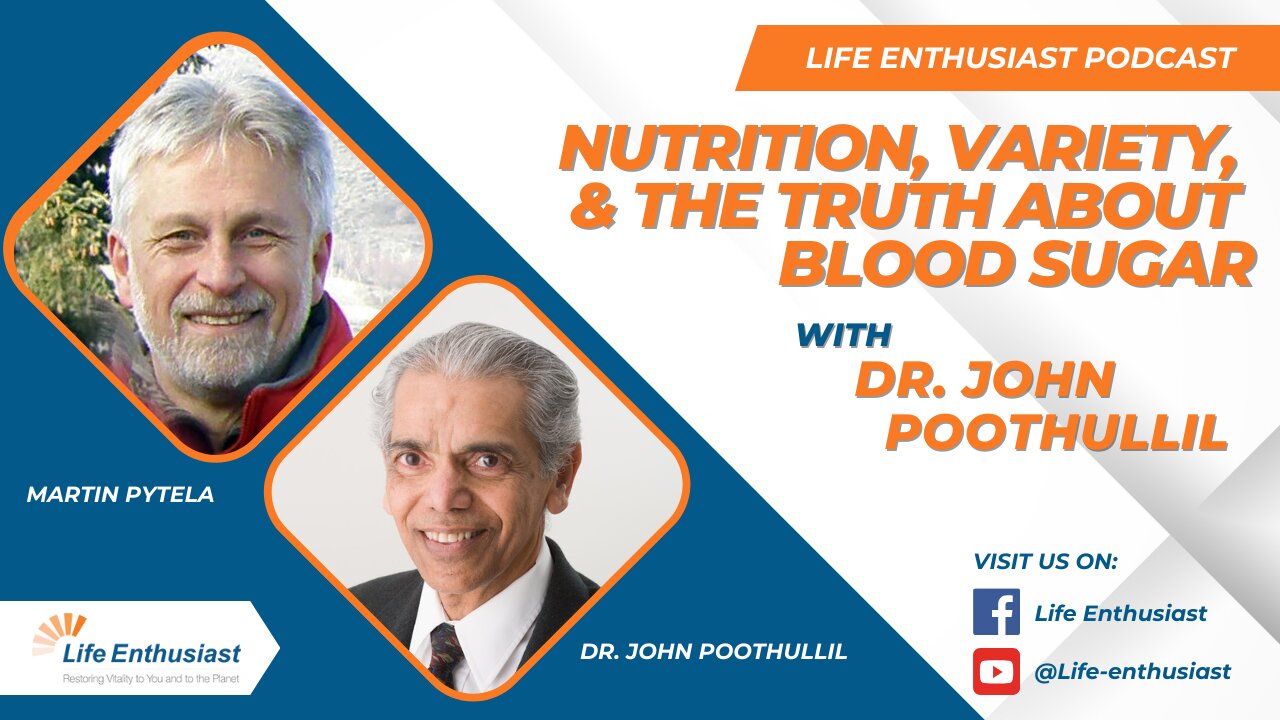Premium Only Content

Nutrition, Variety, and the Truth About Blood Sugar with Dr. John Poothullil
#LifeEnthusiast #health #wellness
When navigating the world of health and chronic disease, we’re constantly bombarded with buzzwords and prevailing theories—many of which become so ingrained in medical culture that we rarely question their validity. One such term is “insulin resistance,” often cited as the major culprit behind high blood sugar and type 2 diabetes. But what if the foundation of this theory is shakier than we think?
In a fascinating episode of the Life Enthusiast podcast, host Martin Pytela sits down with Dr. John Poothullil, a seasoned physician and author, to unpack both the science and the myths surrounding diabetes, insulin, and what drives the epidemic of metabolic disease.
Challenging the Insulin Resistance Narrative
Dr. Poothullil begins by questioning the logic behind insulin resistance. He points out an obvious, yet overlooked, contradiction: adults with high blood sugar (type 2 diabetes) often have normal or even elevated insulin levels. If insulin is present and “ringing the doorbell” of cells as it should, why is glucose staying in the blood? The standard explanation is that cells are refusing insulin’s signal. But, Dr. Poothullil asks: why would only certain cells—those in the liver, fat, and muscle—“resist,” while the rest of the body’s cells do not? And why is there no definitive test to measure this so-called resistance?
He likens the belief in insulin resistance to ancient misconceptions, like thinking the sun revolves around the earth because “that’s how it looks.” In Dr. Poothullil’s view, this is an attractive theory lacking both logic and direct evidence.
A Different Cause: The Fatty Acid Burn Theory
So what’s causing the rise in blood sugar? According to Dr. Poothullil, it comes down to fuel selection in our muscles. Muscles are like hybrid engines: they can run on glucose or fatty acids. Crucially, muscles preferentially use fatty acids if they’re readily available, especially when fat stores in the body are high. When our diet or metabolism leads to an overflow of fatty acids in the blood, muscles switch to burning fat, leaving glucose circulating and blood sugar levels elevated.
This “fatty acid burn theory” explains why some individuals, even those who aren’t severely overweight, can have high blood sugar. Their bodies are flooded with fatty acids due to diet and genetics (such as limited fat storage capacity), and their muscles simply opt not to use glucose.
The Role of Diet: Grains and Processed Foods Under Scrutiny
If the root problem isn’t insulin resistance, but rather excessive and inappropriate energy intake—especially from grains and processed foods—then the solution becomes clear: focus on what, how, and when we eat. Dr. Poothullil draws from examples in anthropology and clinical studies: indigenous populations developed diabetes and obesity only after adopting grain-based, processed diets.
He highlights the rapid improvement seen in Australian Aborigines with diabetes who, upon returning to their ancestral, low-grain diet, normalized their blood sugar and lost weight in just weeks. The lesson? Cut down on grains and processed carbohydrates, and your body’s system of energy regulation can begin to function as intended.
Practical Takeaways: Mindful Eating and Variety
Dr. Poothullil also points to the importance of chewing thoroughly and eating mindfully. Our sensory systems—including the mouth’s receptors—play a crucial role in communicating to the brain our true needs for both satiety and nutrition. Eating quickly or consuming readily available, highly processed foods bypasses these finely tuned mechanisms, encouraging overeating and nutrient imbalances.
His dietary advice is refreshingly straightforward: aim for variety and whole foods. Include several types of vegetables, fruits, and nuts daily, supplement with animal protein as needed, and always be attentive to your body’s signals of hunger and fullness.
Conclusion: Prevention Over Medication
Our culture is unmatched in its ability to treat acute medical crises, but as Dr. Poothullil passionately argues, we fall short in preventing chronic diseases like diabetes. The answer isn’t just better medication—it’s a re-examination of the dietary norms, marketing forces, and outdated theories steering health policy. Prevention is not only possible but, in the long term, vastly more cost-effective and humane.
Dr. Poothullil’s approach is a call to action: question ingrained assumptions, eat as nature intended, and take charge of your health before disease takes charge of you.
For those seeking in-depth guidance, Dr. Poothullil offers further resources on his website and in his books, because the path to wellness begins with understanding, not just compliance.
Hungry for more? Check out Dr. John Poothullil’s works on his website www.DrJohnOnHealth, or find his books on Amazon for new perspectives on diabetes, obesity, and chronic disease prevention.
Timestamps:
00:01 Opening discussion on insulin resistance and questioning its logic.
02:41 Dr. John describes his background in medicine.
04:15 Dr. John’s personal weight gain leads to deeper questions about metabolism.
07:02 Explaining hunger, satiation, and nutrient absorption.
09:05 How insulin works as the body’s “doorbell” for nutrients.
13:44 Critique of the insulin resistance concept.
19:37 Problems with focusing only on blood sugar control in diabetes.
22:00 Importance of glycemic index and reducing grains.
24:16 Why chewing food thoroughly matters.
29:09 How our brains and subconscious guide food variety choices.
33:35 Gut microbiome’s impact on health.
35:50 Muscles preferring fatty acids over glucose—“fatty acid burn theory.”
40:24 Dr. John’s explanation of high blood sugar real cause.
43:03 Humans and grains—evolutionary perspective.
46:49 Aboriginal case study: ancestral diet reverses diabetes.
48:37 Healthcare costs linked to diabetes and grain-based diets.
50:12 Call to redirect farm subsidies toward healthier food.
51:17 Final health advice: eat mindfully, chew well, avoid excess grains.
Website:
https://www.life-enthusiast.com/
https://www.life-enthusiast.com/articles/product_brand/exsula-superfoods?utm_campaign=cherub&utm_medium=youtube&utm_source=exsula-superfoods
Facebook:
https://www.facebook.com/LifeEnthusiastContact
Twitter:
https://twitter.com/lifentco
Youtube:
https://www.youtube.com/user/lifentco
Rumble:
https://rumble.com/user/lifeenthusiastcoop
Telegram:
https://t.me/lifentco
#LifeEnthusiast #health #wellness #podcasts #education #homeopathy
#HighQualityIngredients #NextLevelHealth #SupplementSupport #HerbalHealing #HollisticWellness #NaturalRemedies #AlternativeHealth #TraditionalMedicine #HealthJourney #WellnessSolution #HealthAndWellness #HealthyLiving #HealingPath
#MartinPytela #ScottPaton
-
 10:28
10:28
BlabberingCollector
12 hours agoAsk Blabs, Episode 5 | Answering Your Wizarding World Related Questions
1.17K -
 18:09
18:09
Forrest Galante
5 days agoI Survived 24 Hours In The World's Deadliest Jungle
180K30 -
 LIVE
LIVE
Lofi Girl
2 years agoSynthwave Radio 🌌 - beats to chill/game to
214 watching -
 2:15:09
2:15:09
Badlands Media
16 hours agoOnlyLands Ep. 27: Power Hour Hangover, Trump’s Wartime Shift, and Portland in Flames
104K24 -
 22:21
22:21
DeVory Darkins
6 hours ago $14.96 earnedRioters attack Portland ICE Facility as Democrats make shocking admission
14.3K80 -
 2:06:06
2:06:06
TimcastIRL
8 hours agoTrump DOJ Announces INTERVENTION In Portland Over Nick Sortor Arrest | Timcast IRL
228K377 -
 6:53:58
6:53:58
SpartakusLIVE
10 hours ago#1 All-American HERO with LUSCIOUS hair and AVERAGE forehead brings Friday Night HYPE
65.1K7 -
 3:06:43
3:06:43
Laura Loomer
8 hours agoEP147: Islamic Terror EXPLODES In The West After UK Synagogue Attack
49.1K43 -
 1:02:50
1:02:50
Flyover Conservatives
13 hours agoEric Trump: America’s Most Subpoenaed Man SPEAKS OUT! | FOC Show
43K12 -
 3:36:44
3:36:44
PandaSub2000
1 day agoSuper Mario Galaxy 1 & 2 | ULTRA BEST AT GAMES (Original Live Version)
32.8K3
